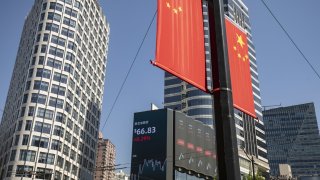
This is CNBC's live blog covering Asia-Pacific markets.
Mainland Chinese stocks fell to a five-year low while Australian stocks smashed all-time records on Wednesday.
The S&P/ASX 200 gained 1.06% and closing at 7,680.7, surpassing its previous record high of 7,632.8 set back on August 13, 2021.
This comes after the country's fourth-quarter inflation rate was lower than expected at 4.1%, its lowest level since the quarter ended December 2021.
Get a weekly recap of the latest San Francisco Bay Area housing news. Sign up for NBC Bay Area’s Housing Deconstructed newsletter.
China's CSI 300 slid to a five-year-low, sinking 0.91% to close at 3,215.35 after China's manufacturing activity shrank for the fourth straight month in January, with the official manufacturing purchasing index at 49.2. Hong Kong's Hang Seng index dropped 1.78%.
Other Asia-Pacific markets were mixed. Japan's Nikkei 225 closed 0.6% higher at 36,286.71, while the broad based Topix also ended nearly 1% higher at 2,551.10.
South Korea's Kospi was down 0.07% at 2,497.09, while the small cap Kosdaq saw a bigger loss of 2.4% closing at at 799.24.
Money Report
The moves come after heavyweight Samsung Electronics reported a 34% fall in operating profit year-on-year in the fourth quarter, as well as a 73.4% plunge in net profit in the same period. Shares of Samsung fell 2.15%.
Overnight in the U.S., the three major indexes ended the day mixed as Wall Street also waits for the latest Fed decision on interest rates.
The Fed funds futures market has priced in a 97% probability that the central bank will leave rates unchanged, according to the CME FedWatch tool, so investors are instead left anticipating a shift in the policy statement that will close out the meeting.
The S&P 500 slipped 0.06%, while the Nasdaq Composite pulled back 0.76%. In contrast, the Dow Jones Industrial Average added 0.35% to end at 38,467.31, marking its seventh record close this year.
— CNBC's Brian Evans and Alex Harring contributed to this report
Singapore unemployment holds steady at 2% in fourth quarter; falls slightly in whole of 2023
Singapore's unemployment rate came in at 2% for the fourth quarter, unchanged from the previous quarter and at the same level compared with the same period in 2022.
The country's manpower ministry said that total employment (excluding migrant domestic workers), expanded by 8,400 in the fourth quarter, growing for the ninth consecutive quarter. Retrenchments fell to 3,200 in the fourth quarter, down from 4,110 in the third quarter.
For the full year of 2023, the overall unemployment rate in Singapore fell from 2.1% to 1.9%.
— Lim Hui Jie
China's official manufacturing PMI in line with expectations for 49.2 in January
China's factory activity contracted for a fourth consecutive month in January, though the official manufacturing purchasing managers' index expectedly rebounded to 49.2 from 49 in December, a six-month low. January's reading is in line with the median forecast in a Reuters poll.
The official non-manufacturing managers' index rose to 50.7 in January from 50.4 in December, according to data from the National Bureau of Statistics released Wednesday. Strength in the country's services industry helped offset weakness in the construction sector amid a slump in the real estate sector.
A PMI reading above 50 indicates expansion in activity, while a reading below that level points to a contraction.
For more, please read the full story.
— Clement Tan
Shares of Samsung slip as operating profit plunges
Shares of Samsung Electronics fell 1.21% after the company posted a 34.57% drop in operating profit in the fourth quarter from a year ago, in line with its guidance issued earlier this month.
Here are Samsung's fourth-quarter results versus estimates:
- Revenue: 67.78 trillion Korean won (about $51 billion), vs. 69.27 trillion Korean won expected by LSEG analysts
- Operating profit: 2.82 trillion Korean won, vs. 3.43 trillion Korean won expected by LSEG analysts
In its earnings guidance earlier this month, Samsung said it expected operating profit for the October-December quarter to be 2.8 trillion South Korean won ($2.13 billion), down 35% from the same period a year ago when the firm reported an operating profit of 4.31 trillion won.
Read the full story here.
— Sheila Chiang
Australia's fourth quarter inflation rate slows to 4.1%, lower than expectations
Australia's consumer price index in the fourth quarter rose 4.1% year-on-year, slower than the 5.4% recorded in the third quarter and also lower than the 4.3% expected by economists polled by Reuters.
This also marks the fourth straight quarter where the inflation rate fell, and marks the lowest level since December 2021.
The trimmed inflation rate, which excludes the most volatile 30% of items, came in at 4.2%, falling from 5.2% in the third quarter.
— Lim Hui Jie
South Korea industrial output cools; retail sales falls in December

South Korea's industrial output cooled in December and retail sales fell, according to official data.
December manufacturing production index increased 0.6%, less than the prior month's 3.3% increase. The reading was still higher than a Reuters poll forecast of a 0.5% increase.
On the consumption side, retail sales in December fell 0.8% from the prior month and was up 2.2% from a year ago. That follows a 1% increase in November.
South Korea's Kospi opened 0.08% lower.
— Shreyashi Sanyal
Trump vs. Biden: Goldman Sachs names the global stocks to play the U.S. elections
As the U.S. presidential election comes into the spotlight, Goldman Sachs has assessed the potential impact on global markets by changes in regulation, taxation, and other government policies.
The Wall Street bank said in a note that if former President Donald Trump returns to power, risks would increase around potential tariffs on European exports and reduced U.S. support for Ukraine. However, it sees U.S. subsidiaries of foreign companies potentially gaining if Trump delivers on a cut to corporation taxes.
The investment bank has also revealed the sectors and stocks most likely to be shielded from President Trump's proposed 10% tariff on all U.S. imports.
CNBC Pro subscribers can read more here.
— Ganesh Rao
CNBC Pro: ‘Substantial upside’: Morgan Stanley fund manager loves this memory stock – and it is among analysts' top picks for 2024
Chipmaker Nvidia and Google parent Alphabet have been hot favorites among investors looking to invest in technology stocks in the past year.
Value investor Aaron Dunn of Morgan Stanley, however, has his sights on another company offering a "value angle on semis" and a "value angle on AI."
Of the 37 analysts covering the stock on FactSet, 29 have a buy or overweight rating on the stock and several have also listed it as one of their top stock picks for 2024.
CNBC Pro subscribers can read more here.
— Amala Balakrishner
Oil rises as IMF boosts growth forecast, market braces for U.S. response to drone attack
Oil prices rose on Tuesday after the International Monetary boosted its growth forecast and as the market braced for the U.S. response to a deadly drone attack on its troops in the Middle East.
The West Texas Intermediate contract for March was last up $1.07, or 1.39%, to trade at $77.85 a barrel. The Brent contract for March last traded at $82.98 a barrel, up 58 cents or 0.70%.
The IMF forecast economic growth of 3.1% this year, up 0.2 percentage points from its October forecast, due to a resilient U.S. economy and stimulus in China.
Geopolitical tensions in the Middle East, meanwhile, are simmering after militants killed three U.S. soldiers in a drone attack in Jordan. The U.S. holds Iran-allied militants responsible and has vowed to respond.
Though the response in the oil market to Mideast turmoil has been muted, analysts warn that direct confrontation between Iran and the U.S. could send prices higher.
— Spencer Kimball
Geopolitical shocks could lead to 'growth disappointments,' says IMF
The International Monetary Fund slightly increased its global growth forecast for 2024, noting that a hard landing is looking less likely — but cited ongoing geopolitical conflicts as potential overhangs to global growth.
"New commodity price spikes from geopolitical shocks––including continued attacks in the Red Sea — and supply disruptions or more persistent underlying inflation could prolong tight monetary conditions. Deepening property sector woes in China or, elsewhere, a disruptive turn to tax hikes and spending cuts could also cause growth disappointments," the organization wrote in its World Economic Outlook Update for 2024.
Nonetheless, the IMF raised its global growth projection to 3.1% in 2024, which is 0.2% higher than its forecast from October 2023.
— Hakyung Kim
35 S&P 500 stocks reach new all-time highs during Tuesday's trading session
53 stocks in the S&P 500 notched new 52-week highs during Tuesday's trading session.
Of these names, 35 companies cinched new all-time highs, including "Magnificent 7" stocks Meta Platforms, Microsoft and Nvidia.
Here are some other names that reached new all-time high levels on Tuesday:
- AutoZone
- Chipotle Mexican Grill
- Marathon Petroleum
- MasterCard
- Caterpillar
- Waste Management
- ServiceNow
- Uber
- Visa
— Lisa Kailai Han, Christopher Hayes
Goldman Sachs' David Kostin expects the market rally to broaden in 2024
This year, it's time for the other 493 stocks in the S&P 500 to shine, according to Goldman Sachs' chief U.S. equity strategist David Kostin.
While the "Magnificent 7" tech titans led last year's market outperformance, Kostin believes that the rally is due to broaden this year.
"We'll take the Russell 2000 and the small caps," he said on CNBC's "Squawk on the Street" on Tuesday morning.
As a strong economy causes the Federal Reserve to begin cutting interest rates this year, Kostin believes that this will benefit the small-cap names with less stable balance balance sheets and more floating rate debt.
"Some of the net interest income for a lot of companies with strong cash positions should diminish over time as the Fed is cutting," Kostin added.
— Lisa Kailai Han






